Archive for October 24th, 2010
Legal cries foul over FOI
(CNS): The publication of a freedom of information request by a local attorney in the local press, which revealed that the legal department has failed to prosecute more than forty criminal cases of over the last five years, has drawn the wrath of the Solicitor General’s Office. The FOI made by Peter Polack shows that, as a result of the statute of limitations, a list of crimes, of which no details were given, have never been prosecuted because the authorities did not take the cases to court within the six month deadline from the time the alleged offences were reported. On Friday afternoon the legal department denied having control over the time files take to come from the police.
The facts of the FOI were published as the lead article in Friday’s edition of The Caymanian Compass. The solicitor general accused the paper of “bringing the Cayman Islands system of justice into disrepute” in the story, which was based on the details of what is now a public document.
The FOI was actually granted by the RCIPS as opposed to the legal department because, Polack told CNS, it appeared that the legal department did not have the records on any of these non-prosecuted cases, despite being the body responsible. The police gave Pollack a list of dates indicating 43 unprosecuted criminal cases and two traffic offences, all of which had run out of time.
Pollack said he believed it was incompetence that had resulted in these cases being irreversibly jeopardized and someone should resign. “Perhaps what is of greater concern is the deafening silence in the legislature on the matter of oversight and audit of the legal department,” he added.
In the Compass article the RCIPS explained that cases are statute-barred when officers are unable to complete their investigation and bring charges within the stipulated period time-frame.
“There are many reasons why an officer may be unable to complete the case within the permitted time, for example, being unable to trace witnesses who have left the jurisdiction,” the police spokesperson said.
The Compass said it had attempted to contact the Solicitor General’s Office before the article appeared to establish whose responsibility prosecuting these offences is, but the office did not respond by press time.
Solicitor General Cheryll Richards then released a critical statement late on Friday afternoon suggesting that the article was a misrepresentation of the facts and that the process of prosecution requires a comprehensive criminal file to be submitted to the legal department.
“From time to time, the department has been compelled to advise the RCIPS that the matter cannot proceed because the time prescribed by law, within which charges can statutorily be laid, has elapsed,” the solicitor general stated. “When a submitted file is statute barred, a public prosecutor would advise the investigator of this legal position. It would be irresponsible and contrary to the law not to.”
The office said the legal department doesn’t have control over when a file is submitted for review after a complaint has been made to the RCIPS or an investigation conducted. “The time frame for completion of investigations is a matter for the police. We agree with the RCIPS spokesperson that there are many reasons which may be outside of the control of the police as to why an investigating officer may be unable to complete an investigation before the time period has elapsed,” the SG stated.
She also stated that the legal department “obviously could not properly have a record of files which have not been submitted for review,” hence why the RCIPS responded to the FOI, but the office said it remained puzzled why the legal department and the prosecution system had been misrepresented in the article.
FOI Repsonse – Statute Barred Cases, last five years
Statute Barred Cases In The Last Five Year Period, Dates Of Cases

No sign of disability laws
 (CNS): Laws to protect those who are disabled from discrimination and enhance their access to public life have not yet appeared on the legislative table, which the Constitution Commission has said is of concern. The commissioners have said the lack of legislation protecting the disabled is one of a number of areas likely to leave government vulnerable to legal challenges once the Bill of Rights comes in to effect in November. The commission has pointed out that, even if there are hold-ups in writing new laws, the government could still be adopting policies that would ensure equal treatment for people with disabilities.
(CNS): Laws to protect those who are disabled from discrimination and enhance their access to public life have not yet appeared on the legislative table, which the Constitution Commission has said is of concern. The commissioners have said the lack of legislation protecting the disabled is one of a number of areas likely to leave government vulnerable to legal challenges once the Bill of Rights comes in to effect in November. The commission has pointed out that, even if there are hold-ups in writing new laws, the government could still be adopting policies that would ensure equal treatment for people with disabilities.
Although a comprehensive report recommending the various changes to existing legislation and the introduction of new legislation to address the issue of people with disabilities was given to government in February 2009, there is no sign of any proposed legislation. The last time government spoke publicly about the disability laws was over one year ago in September 2009. At that time the minister with responsibility, Rolston Anglin, said he was “anxious to … take the report forward to the next stages, which will involve public review and debate,” as “persons with disabilities in Cayman have long been pushed into the shadows.”
Speaking at a recent briefing to launch its first report, members of the Constitution Commission pointed out that a lot of work had been done in this area by the legal sub-committee for people with disabilities but no policies had yet been implemented and there has been no further news on any legislative or policy developments.
“It would be good to see legislation enacted as soon as possible, but we don’t need to wait for laws to start following non-discrimination policies,” noted Wil Pineau, one of the commissioners. “We need to start putting these things into practice. There is no need to wait for the Bill of Rights to be in place before starting to follow non-discriminatory policies.”
At present Cayman has very little legislative protection for people with disabilities. What there is exists in parts of various different laws, such as the Mental Health Law, but there is no comprehensive way to ensure access to services for, or prevent discrimination of, the disabled.
Moreover, the enactment of the Bill of Rights will not necessarily improve that situation very much for the disabled as the protection under the Constitution is quite limited. As a result of a compromise made in the writing of the Bill of Rights, the Human Rights Committee (which existed until the Constitution came into effect) warned that people with disabilities would be vulnerable even after the bill was enforced and the need for protective domestic legislation was all the more pressing.
Section 16 in the bill, which deals with non-discrimination, had originally been written so government would not be able to discriminate against anyone at any time. The right to equality was originally included as a “free-standing” right and applied in all areas of daily life, including healthcare, housing and employment. However, the compromised form means the right not to be discriminated against only applies to the areas of public life dealt with in the Constitution itself.
This means people with disabilities are not necessarily protected by the Bill of Rights when it comes to healthcare, housing, employment, access to public spaces, and the provision of social services, forcing the need for domestic legislation with teeth.
At the time of the constitutional deliberations the Human Rights Committee pointed out that the right of non-discrimination had been compromised in an effort to remove any protection for homosexuals and transsexuals. The HRC warned that the right of non-discrimination for vulnerable people, including mentally and physically handicapped persons, would also be undermined, especially as Cayman’s legal environment when it come to the disabled was so poor.
For example, even when the Bill of Rights is enforced a disabled person could not compel the government to put in wheelchair ramps or handrails to allow access to public buildings or facilities, including schools.
The HRC and advocates from local the non-governmental organisation Equality Cayman warned at the time that the disabled could be marginalised by the constitutional compromise as government could not necessarily be trusted to enact the necessary anti-discrimination legislation. They noted too that even if it did there was nothing to prevent another administration overturning that legislation.

Cayman’s fund business faces more transparency
 (CNS): The director of the country’s regulator has warned that the future of the fund industry will be about deeper disclosure and transparency, as well as broader oversight and tighter control. In a speech at a recent fund conference, Cindy Scotland said that the more stringent international regulations, which were the inevitable outcome of the global financial crisis, were taking shape and the country’s industry players would need to ensure they participate and help the rest of the world understand that the Cayman Islands is not part of the problem. Scotland said those working here may see the jurisdiction as a world-class international financial centre, but if Cayman is not to be marginalised it has to play by international rules.
(CNS): The director of the country’s regulator has warned that the future of the fund industry will be about deeper disclosure and transparency, as well as broader oversight and tighter control. In a speech at a recent fund conference, Cindy Scotland said that the more stringent international regulations, which were the inevitable outcome of the global financial crisis, were taking shape and the country’s industry players would need to ensure they participate and help the rest of the world understand that the Cayman Islands is not part of the problem. Scotland said those working here may see the jurisdiction as a world-class international financial centre, but if Cayman is not to be marginalised it has to play by international rules.
“We do know that part of the objective of these initiatives is to curtail the use of jurisdictions such as the Cayman Islands, which offer competitive advantages. We are still seen as part of the problem. As a jurisdiction, we have to make it known, both in our talk and in our walk, that the services we provide to entities in other jurisdictions in fact complement and enhance the economic activities of those jurisdictions rather than detract from them. They meet international standards and are open to scrutiny,” Scotland said in a speech, which was delivered to the Campbell’s fund conference by Patrick Bodden, Cayman Islands Monetary Authority Deputy Managing Director of Operations.
Talking about the changes around the world and their potential impact on the Cayman Islands financial sector, she said the Dodd-Frank Wall Street Reform Act removed the previously-existing ban on US banks paying interest on demand deposit accounts.
“As you probably know, many US banks have established relationships here to utilize ‘sweep account’ facilities, through which their demand deposits can earn overnight interest. The removal of the ban on interest payments on demand deposits in the US will therefore have an impact on the consideration of such facilities offered in Cayman. Will this mean a loss of this type of business for us? The answer will depend on what additional value we are providing to the users of these services,” Scotland noted.
“Another provision of the Dodd-Frank Act will bring within the Securities and Exchange Commission’s regulatory net most private advisers to US funds/investors by July 2011. This will likely affect many of our fund managers, carrying with it increased reporting obligations to, and scrutiny by, the SEC. Affected advisers will have to garner additional resources in order to meet these requirements.”
Basel III requires banks to hold larger minimum capital reserves, which will limit the availability of credit to businesses, but Scotland pointed out that the minimum capital that CIMA has always required Cayman-licensed banks to hold has been higher than the Basel requirement. “Significantly, none of our banks failed during the financial crisis and the banking sector has always been able to make loans available,” she added, noting that on that principle at least Cayman is ahead of Basel III.
But she said current times present serious challenges and like it or not there would be increasing regulatory requirements for service providers to gain access to US and European markets.
“As the jurisdictional regulator of financial services, the Cayman Islands Monetary Authority remains committed to meeting international standards as they develop,” the regulatory boss stated. “At the same time, we are cognizant of the increased competitive forces and the need to retain our international competitiveness.”
While the framework governing the conductof business in and from the Cayman Islands is sound, Scotland observed, it was still something that has to be internalised by every individual who operates in and from the Cayman Islands.
“We may convince ourselves that as individuals our responsibility is to our bottom line and that of our clients. But let us understand this: How far the movement to new regulations both internationally and locally eventually goes will be determined in great measure by how market participants operate,” she said.
The director revealed that in its goal to help Cayman’s finance industry remain competitive and innovative, CIMA has spent time assessing the current environment and identified four strategic priorities which it will be pursuing over the next two years.
Number one, Scotland said, was to further modernise and enhance regulation and supervision relevant to Cayman business. Number two was to intensify CIMA’s international cooperation and involvement of international rules and standards that affect this jurisdiction, and to enhance the jurisdiction’s reputation. The third priority is to facilitate the development of the Cayman Islands as an International Financial Centre; and finally for CIMA itself to improve efficiency.
She said that while the industry was at a crossroads it had faced many turning points over the last 50 years of existence. “We have always been able to move to higher ground when faced with the challenges. I believe we can do so now,” Scotland added.
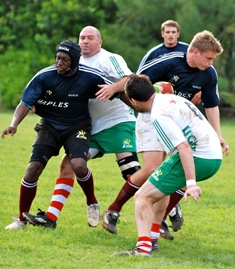
Heineken 7’s heat up as women join the action
 (CRFU): With the Premier Division and Social Divisions producing ever more fast paced and exciting games it is with no surprise that the women have joined the act by adding 2 ladies teams to the schedule of 7’s games being played every Saturday in October. With the Heineken Thunder looking to extend their lead at the top of premier division all eyes were on the O’Neill Wolfhounds to see if they could put credence to the words of former national 7’s captain Johnny Doak who, during the live broadcast of “Backchat” on www.caymanrugbytv.com, said that in order to stop the Thunder you need only stop their go to player Ratu Nemesio Wakanibua. Photos by Caroline Deegan
(CRFU): With the Premier Division and Social Divisions producing ever more fast paced and exciting games it is with no surprise that the women have joined the act by adding 2 ladies teams to the schedule of 7’s games being played every Saturday in October. With the Heineken Thunder looking to extend their lead at the top of premier division all eyes were on the O’Neill Wolfhounds to see if they could put credence to the words of former national 7’s captain Johnny Doak who, during the live broadcast of “Backchat” on www.caymanrugbytv.com, said that in order to stop the Thunder you need only stop their go to player Ratu Nemesio Wakanibua. Photos by Caroline Deegan
With the Heineken Thunder looking to extend their lead at the top of premier division all eyes were on the O’Neill Wolfhounds to see if they could put credence to the words of former national 7’s captain Johnny Doak who, during the live broadcast of “Backchat” on www.caymanrugbytv.com said that in order to stop the Thunder you need only stop their go to player Ratu Nemesio Wakanibua.
The Wolfhounds, who in the 2 previous weeks had not come close to stopping the Thunder’s star player put on their best display of the campaign to date but it was not Doak who stopped Wakanibua but rather the diminutive James Waters, returning from a long term knee injury, who managed a try saving tackle on Ratu to ensure that the Wolfounds won their first game of the 7’s season in style 10-5.
 The Ama Tsotsi, who had so far been jinxed by the Thunder in each of their encounters against the Thunder looked to seal the nail in the coffin for the men in yellow in week 3 by subjecting the Thunder to their 2nd loss of the day but were instead limited once more to a lacklustre 12-12 draw. The draw however was enough to ensure that the Thunder would not progress to their 2nd consecutive final as the only team not to earn a win in the premier division on the day.
The Ama Tsotsi, who had so far been jinxed by the Thunder in each of their encounters against the Thunder looked to seal the nail in the coffin for the men in yellow in week 3 by subjecting the Thunder to their 2nd loss of the day but were instead limited once more to a lacklustre 12-12 draw. The draw however was enough to ensure that the Thunder would not progress to their 2nd consecutive final as the only team not to earn a win in the premier division on the day.
The premier division final between the Ama Tsotsi and the Wolfhounds started with one way traffic for the Africans who had early in the day subjected the Wolfhounds to a 29-0 hammering but thanks to late tries from Johnny Doak and James Waters the Wolfhounds saved some face in a 24-12 loss which saw the Wolfhounds playing with 6 men for much on the encounter due to Saviriano Wakanibua of the Wolfhounds being red carded for a dangerous tackle.
After week 3 the tables are too close for comfort
Heineken Thunder O’Neill Wolfhounds Ama Tsotsi
Week 1 10 10 5*
Week 2 20 10 15
Week 3 10 15 20
Totals 40 35 40
* 5 point deduction for fielding an ineligible player.
Social Division
In the social division it was business as usual as the Omni sharks played the day as undefeated champions thanks to their supreme speed and fitness and tenacious attitude on the field of play. Maples came closest to taking the younger scalps of the sharks but were outdone at the last 26-22.
A resurgent Clydesdales side took out the Omni-Remax Knackers 26-10 and put up much improved attacking and defensive display against the Sharks 21-10. In their final outing of the day the Clydesdale were narrowly defeated by Maples as the Lawyers eked out a slim 21-17 win.
The Remax Knackers struggled on Saturday recording their only points of the day against the Clydesdales but with the Clydesdales still propping up the bottom of the social division table there is still much to play for coming into week 4 of the Heineken 7’s
Omni Remax Knackers Heineken Clydesdale Lights Maples Omni Sharks
Week 1 10 5 15 20
Week 2 15 5 10 20
Week 3 5 10 15 20
Totals 30 20 40 60
This article was submitted by CRFU
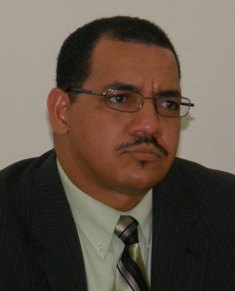
Census will inform future human capital policy
 (CNS): The results of the national census will be used to make new policies to develop the country’s human capital the education minister said last week. As well as counting the population the census will be measuring a number of other issues the results of which will be available at the end of 2011 officials have said. Minister of Education, Training and Employment, Rolston Anglin said the information from the census would be used to “change, grow and develop for the better” policies I education and employment.
(CNS): The results of the national census will be used to make new policies to develop the country’s human capital the education minister said last week. As well as counting the population the census will be measuring a number of other issues the results of which will be available at the end of 2011 officials have said. Minister of Education, Training and Employment, Rolston Anglin said the information from the census would be used to “change, grow and develop for the better” policies I education and employment.
“Data gathered from this census will strengthen our path, supplying us with vital details regarding the education and employment of our people,” the minister said. “It will give us the power to make truly informed decisions on the best legislative and policy reforms necessary for developing our human capital.”
Statistical data from each section is designed to help officials determine issues such as how many special education teachers are needed in our schools, or forecast the number of students likely to live in each district over the next five to ten years. Figures like the national unemployment rate, as well as the percentage of residents employed in each industry will also be calculated.
Chief Education Officer Shirley Wahler added, “A good educational system relies on high-quality information. The more we collectively know about our students and our country, the better we can meet future needs.
The census exercise began on Sunday, 10 October and ends Tuesday, 30 November. Everyone, including children for whom a census activity book has been especially designed, will have an opportunity to participate.
Cayman to host Caribbean weather summit
(CNS): Government minister and officials responsible for meteorological services, from 16 Caribbean territories will be coming to Grand Cayman next month for the 50th session of the Caribbean Meteorological Council. The Council is the supreme body of the Caribbean Meteorological Organization (CMO) which is the region’s specialised agency that coordinates joint scientific and technical activities in weather, climate and water-related sciences in the Caribbean territories. As host, Deputy Premier Juliana O’Connor-Connolly, who has responsibility for local met services, will be this year’s chairperson.
“The Cayman Islands Government is delighted to host this prestigious event. While we had already hosted two CMC meetings more than a decade ago, being selected to host the 50th anniversary meeting is a major achievement,” she said.
Staging this meeting indicates Cayman’s growing significance and influence in regional meteorology, O’Connor-Connolly said. .
National Weather Service (CINWS) Director-General Fred Sambula explained that the theme is “Towards a global framework for climate services” and the growing focusing in the field on predicting long-term weather conditions and forecasts that can assist governments in national development and planning.
“At the third World Climate Conference held in Geneva in 2009, United Nations and World Meteorological Organization officials joined Heads of State and Governments and scientists from 160 countries in agreeing that weather services around the globe need to focus more on providing society with user-friendly climate services, including regionally-oriented long-term climate predictions,” he said. “This shift will be of more value to governments, as forecasting weather and climate over the next 10 to 15 years and beyond will enable governments to determine in which areas of the economy to invest and how to spend national resources.”
The CMC50 meeting will look at how each territory, and the region as a whole, can contribute to the Global Framework for Climate Services (GFCS), Sambula added.
The Council will be joined by the Secretary-General of the World Meteorological Organization, Michel Jarraud of France, and a member of the High-Level Taskforce on the GFCS.
The Council will also examine the progress made by Meteorological Services in the region to adapt to stricter international standards for service to the aviation community; improvements in the regional hurricane warning system, and disaster preparedness and other projects.
CMC 50 will begin with a closed door session of the Board of Governors of the Caribbean Institute for Meteorology and Hydrology on 18 and 19 November. Directors of the Meteorological Services will meet on Saturday, 20 November in another closed session. The official opening of the Caribbean Meteorological Council’s 50th session will take place on Monday, 22 November and the sitting of the 50th session will run until Tuesday, 23 November.
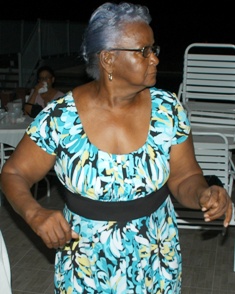
Old folk party on at Grand Caymanian
 (CNS): Nearly 50 seniors were celebrating life at special long weekend get together at the Grand Caymanian Resort as part of Older Persons Month. Seniors from each district performed and were entertained over the three days including a treasure hunt; a movie; a ‘shopping on a budget’ contest at the Strand Foster’s Food Fair; table games and a lunch at Champion House. Retreat organizer, Department of Children and Family Services (DCFS) Community Development Coordinator Zemrie Thompson said that the weekend was specifically aimed at giving seniors quality time, a break from the hustle and bustle of daily life.
(CNS): Nearly 50 seniors were celebrating life at special long weekend get together at the Grand Caymanian Resort as part of Older Persons Month. Seniors from each district performed and were entertained over the three days including a treasure hunt; a movie; a ‘shopping on a budget’ contest at the Strand Foster’s Food Fair; table games and a lunch at Champion House. Retreat organizer, Department of Children and Family Services (DCFS) Community Development Coordinator Zemrie Thompson said that the weekend was specifically aimed at giving seniors quality time, a break from the hustle and bustle of daily life.
“We scheduled fun events to get everyone involved. It turned out to be a really positive interlude and the seniors were able to bond with each other,” she said.
The grand finale was the Saturday evening reception at the Ramada. The seniors enjoyed a sumptuous meal and went on to dance the night away. Entertainment was provided by Clive Bennett and Keisha Webb who both performed solos, and DJ Blemo Ross.
“Anyone who missed this retreat lost out on a great time,” said senior Jane Ramoon. “It was nice that we could come together to share and catch up on old times.”
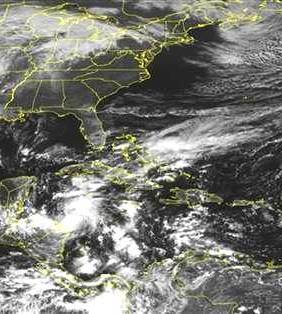
Richard becomes the tenth hurricane of 2010 season
 (CNS): At 9am local time on Sunday the NHC announced that Richard had become a hurricane. With sustained winds of 85mph and higher gusts, Richard, the tenth hurricane of what has proved to be a busy season, was a category one hurricane located about 95miles ESE of Belize City. Moving toward the west-northwest near 12 mph on the forecast track, Richard will reach the coast of Belize by this evening and move over land tonight and Monday but additional strengthening is expected as it moves inland. Hurricane force winds extend up to 15 miles and tropical storm force winds up to 105 from the centre.
(CNS): At 9am local time on Sunday the NHC announced that Richard had become a hurricane. With sustained winds of 85mph and higher gusts, Richard, the tenth hurricane of what has proved to be a busy season, was a category one hurricane located about 95miles ESE of Belize City. Moving toward the west-northwest near 12 mph on the forecast track, Richard will reach the coast of Belize by this evening and move over land tonight and Monday but additional strengthening is expected as it moves inland. Hurricane force winds extend up to 15 miles and tropical storm force winds up to 105 from the centre.
Although Richard had brought rainy conditions to Cayman over most of last week, Sunday’s local weather forecast called for improved conditions over Cayman as the majority of clouds and shower activity association with Richard continue to move westward and away from our area. With partly cloudy skies and a 30% chance of isolated showers and possible thunder temperatures will rise to the mid 80’s on Sunday. Winds will be east to southeast 10 to 15 knots. Seas will be moderate with wave heights of 3 to 5 feet with similar conditions on Monday

CITA seeks nominees for Stingray awards
(CNS): The Cayman Islands Tourism Association (CITA) has opened the nominations for the 2010 Cayman Stingray Tourism Awards. The Stingrays recognise individuals who have offered the greatest contribution towards the well-being of the Cayman Islands tourism industry and the Association’s affairs throughout the year. The Awards also recognize those who contribute to creating an extraordinary experience for guests. As one of the country’s two economic pillars CITA said there is virtually no business which is not affected by and or dependent on the success of Tourism.
Nominees which can only be made by CITA members are recognized in a number of categories: Accommodation Employee of the Year, Accommodation Manager of the Year, Allied Employee of the Year, Allied Manager of the Year, Lifetime Achievement Award, Long Service/Special Contribution Award, Restaurant Employee of the Year, Restaurant Manager of the Year, Rising Star of Tourism Award, Tourism Excellence Award, Transportation Employee of the Year, Transportation Manger of the Year, Water Sports Employee of the Year and Water Sports Manager of the Year.
One area that the CITA Education & Training Committee said it would like to see more nominations submitted for is the Allied Sector. This sector represents businesses in Retail, Distribution, Media, Suppliers and all Tourism Services, each of whom play an integral role in our tourism industry. From the retailer who deals with both cruise and stay-over visitors on a daily basis to even the bank teller who assists our visitors with their currency exchange.
Stephen Broadbelt Owner of Ocean Frontiers and Compass Point and Immediate Past President of the CITA said the awards are one of the most important events of the year.
“They allow us to thank and recognize our employees for their contribution to our business and the industry overall,” he said. “The event makes a huge difference on staff morale and they talk about the Gala for the entire year. They work hard and aspire to get a nomination over their co-worker s. They really appreciate the experience of getting dressed up and enjoy an evening where they can truly shine.”
Nomination Forms have been sent out to all CITA business members and the association looks forward to announcing the nominees for each category by the end of October.
Tickets are on sale now $75.00 per person (tables of 10). All proceeds from this event are contributed to the Scholarship Fund which is awarded by CITA to an outstanding individual pursuing a career in Tourism.
To become a member of the CITA and nominate individuals in your business or to purchase tickets in support of The Cayman StingrayTourism Awards 2010 Gala, please contact Erin Bodden of CITA, by emailing info@cita.ky or by calling 949-8522. Office hours are Monday to Friday 9:00am to 5:00pm.
The awards gala will be held Tuesday 9 November at The Grand Cayman Marriott Beach Resort.
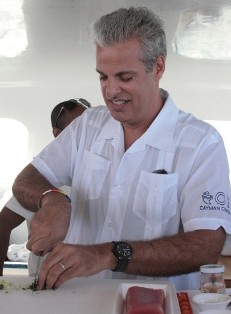
Festival for food lovers to host gourmet stars
 (CNS): Celebrity chef Eric Ripert creator of Cayman’s acclaimed restaurant Blue, and Anthony Bourdain will be heading an all star culinary line up in January at the Department of Tourism’s third annual Cayman Cookout. José Andrés, Rachel Allen, Susur Lee, Michael Schwartz, Charlie Trotter, Food & Wine magazine’s Gail Simmons and wine and spirits experts Ray Isle, Anthony Giglio, Denis Cakebread and Bo Barrett will take visitors on a four-day journey across Grand Cayman with demonstrations, tastings, and excursions for both avid foodies and the curious family cook.
(CNS): Celebrity chef Eric Ripert creator of Cayman’s acclaimed restaurant Blue, and Anthony Bourdain will be heading an all star culinary line up in January at the Department of Tourism’s third annual Cayman Cookout. José Andrés, Rachel Allen, Susur Lee, Michael Schwartz, Charlie Trotter, Food & Wine magazine’s Gail Simmons and wine and spirits experts Ray Isle, Anthony Giglio, Denis Cakebread and Bo Barrett will take visitors on a four-day journey across Grand Cayman with demonstrations, tastings, and excursions for both avid foodies and the curious family cook.
The weekend includes a variety of food events from dining under the stars along Seven Mile Beach to casual conversations and unparalleled cuisine prepared by some of the world’s top chefs in the most intimate of settings.
“We’re excited to be partnering with The Ritz-Carlton, Grand Cayman and Food & Wine magazine to bring Cayman Cookout for the third consecutive year,” said acting Director of Tourism, Shomari Scott.
“Each year, we witness the four-day weekend grow with the addition of new events tantalizing the taste buds of even the most discerning of diners, and Cayman Cookout 2011 is sure to attract those truly passionate about great food.”
Scott noted that cuisine plays an important role in the history and culture of the Cayman Islands.
“Cayman Cookout allows DoT to deliver great days of mouth-watering indulgence amidst the serene beauty of paradise, and offers guests the chance to meet and mingle with top chefs and TV extraordinaires,” he added.
Cayman cookout will be the first of a number of culinary events for January following the four day event the Grand Cayman Marriott Beach Resort will be hosting a Caribbean Food & Art Dinner where guests can expect to delight in local delicacies while enjoying the work of local artists. On 22 January the rum drink mixing competition takes place at Rum Point followed by the much loved national annual food festival, Taste of Cayman.
“Cayman Cookout and the additional epicurean events scheduled throughout the month of January will offer locals and visitors alike a wide array of opportunities to absorb up close and delight in the extensive culinary offerings of Cayman’s cuisine.”
For more information about Cayman Cookout or to purchase your tickets, visit www.caymanislands.ky/cayman_cookout.